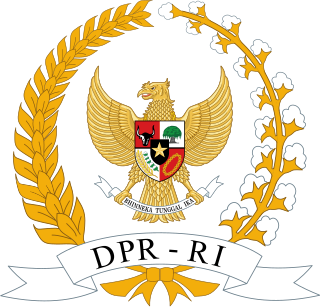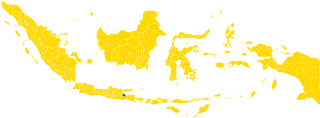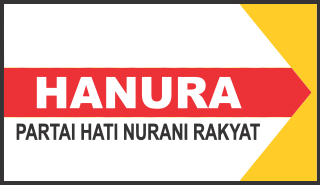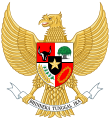
The Indonesian Democratic Party of Struggle is a centre to centre-left secular-nationalist political party in Indonesia. Since 2014, it has been the ruling and largest party in the House of Representatives (DPR), having won 110 seats in the latest election. The party is led by Megawati Sukarnoputri, who served as the president of Indonesia from 2001 to 2004.

The United Development Party is an Islam-based political party in Indonesia.

Legislative elections were held in on 5 April 2004 for both houses of the People's Consultative Assembly of Indonesia. This included all 550 seats in the People's Representative Council and 128 seats of the newly formed Regional Representative Council.

Presidential elections were held in Indonesia on 5 July and 20 September 2004. As no candidate won a majority in the first round, a runoff was held, in which Susilo Bambang Yudhoyono defeated Megawati Sukarnoputri and was elected president. They were the first direct presidential elections in the history of Indonesia; prior to a 2002 amendment to the Constitution of Indonesia, both the president and vice president had been elected by the People's Consultative Assembly (MPR).

The House of Representatives of the Republic of Indonesia is one of two elected chambers of the People's Consultative Assembly (MPR), the national legislature of Indonesia. It is considered the lower house, while the Regional Representative Council (DPD) serves as the upper house; while the Indonesian constitution does not explicitly mention the divide, the DPR enjoys more power, privilege, and prestige compared to the DPD.

Elections in Indonesia have taken place since 1955 to elect a legislature. At a national level, Indonesian people did not elect a head of state – the president – until 2004. Since then, the president is elected for a five-year term, as are the 580-member People's Representative Council, the 152-seat Regional Representative Council in 2024 general election, in addition to provincial and municipal legislative councils.

The Democratic Party is a centre to centre-right nationalist political party in Indonesia. Currently, it holds 44 seats in the House of Representatives (DPR). It is led by Agus Harimurti Yudhoyono (AHY), the son of Susilo Bambang Yudhoyono (SBY), who served as the President of Indonesia from 2004 to 2014.

The Indonesian Democratic Party was a political party in Indonesia which existed from 1973 to 2003. During the New Order era, the PDI was one of the two state-approved parties, the other being the Islam-based United Development Party (PPP).

The National Mandate Party, frequently abbreviated to PAN, is a non-sectarian, religion-based political party in Indonesia.

The Justice and Unity Party formerly known as Indonesian Justice and Unity Party is a political party in Indonesia.

Legislative elections were held in Indonesia on 2 May 1977. They were the third legislative elections since independence, and the second under the New Order regime. There were three participants; the two political parties and functional group Golkar.

Legislative elections were held in Indonesia on 23 April 1987, to elect 400 of the 500 members of the People's Representative Council (DPR), the national legislature. The election was the fifth legislative election in the country since independence and the fourth legislative election under President Suharto's New Order. The election resulted in an outright majority for Golkar, which retained its status as the ruling party of the country.

Legislative elections were held in Indonesia on 9 June 1992, to select 400 of the 500 members of the People's Representative Council (DPR). The election was the sixth legislative elections since Indonesian independence and the fifth legislative elections under the New Order regime of president Suharto. The election resulted in a clear victory for Golkar, which retained its status as the ruling party, although the opposition, under the United Development Party (PPP) and the Indonesian Democratic Party (PDI), saw their vote shares rise.

Early legislative elections were held in Indonesia on 7 June 1999. They were the first elections since the fall of Suharto and end of the New Order, the first free elections in Indonesia since 1955, and the first and only free legislative election held in East Timor during Indonesian provincehood. With the ending of restrictions on political activity following the fall of Suharto, a total of 48 parties contested the 462 seats up for election in the People's Representative Council. A further 38 seats were reserved for members of the armed forces.

Legislative elections were held in Indonesia on 9 April 2009 for 132 seats of the Regional Representative Council (DPD) and 560 seats of the People's Representative Council (DPR). A total of 38 parties met the requirements to be allowed to participate in the national elections, with a further six regional parties contesting in Aceh only. The Democratic Party of incumbent President Susilo Bambang Yudhoyono won the largest share of the vote, followed by Golkar and the Indonesian Democratic Party of Struggle.

The People's Conscience Party, better known by its abbreviation, Hanura, is a political party in Indonesia. It was established following a meeting in Jakarta on 13–14 December 2006 and first headed by former Indonesian National Armed Forces commander Wiranto. The party lost its seats in the People's Representative Council after a poor performance in the 2019 general election.

The Speaker of the House of Representatives, is the presiding officer of the House of Representatives of Indonesia. The speaker is the political and parliamentary leader of the House of Representatives and is simultaneously the Council's presiding officer. The speakers also perform various other administrative and procedural functions.

Union of Islamic Education, also known as PERTI, is a Shafii-Ash'ari Islamic organization in Indonesia. The organization was founded by Sulaiman ar-Rasuli on May 5, 1928 in Candung, West Sumatra. In its development, PERTI had become a political party and gained four People's Representative Council (DPR-RI) seats and seven Constituent seats in 1955 general election.

The first inauguration of Susilo Bambang Yudhoyono as the 6th president of Indonesia took place on Wednesday, 20 October 2004. Yudhoyono was the first democratically and directly elected president of Indonesia, as the previous presidents were elected by the People's Consultative Assembly.
























